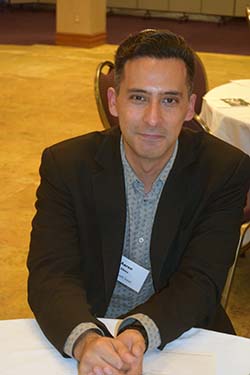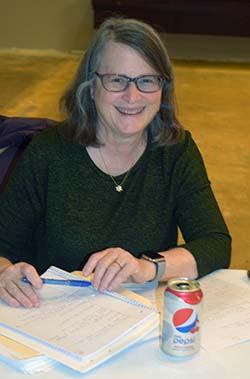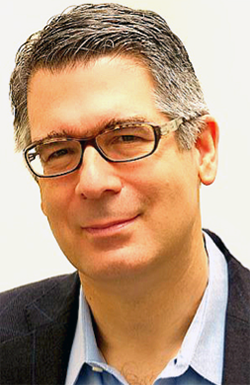By Donald H. Harrison


SAN DIEGO – A well-known question of ethics asks what you would do if you saw a train coming down the tracks on which five people were immobilized and sure to be killed if the train kept coming. Suppose there was a switch that could change the track on which the train traveled, but that would result in the death of one person, similarly immobilized. What would you do?
Most people would answer that they would pull the switch, so that only one person died rather than five, on the theory that the lives of five outweighed the life of one. Prof. Aaron C. Elkins, who directs management information systems at San Diego State University’s James Silberrod Brown Center for Artificial Intelligence, said Thursday night that a similar question may arise with the programming of self-driving cars. Suppose the on-board computer recognizes that if the car continues going straight, it will kill five people up ahead. But if it veers to the right, only one person will be killed – you, the passenger. What decision should the car be programmed to make?
Elkins was one of three presenters at a Tikun Leil Shavuot, a Shavuot night study session at Tifereth Israel Synagogue. The others were Marcia Tatz Wollner, who spoke about book banning and burning through the ages, and Dr. Seth Krosner, M.D., a critical care surgery specialist, who discussed what Jewish texts have to say about decisions concerning end of life and abortions.
Rabbi Mathew Marko, the Conservative congregation’s spiritual leader, said one midrash explaining the custom of Shavuot night study harkens back to the time of the Exodus when the Hebrews were waiting at Mt. Sinai to receive the Torah. Supposedly, they went to sleep early the night before the Torah was received, but overslept, prompting Moses to wonder why no one was there for such a momentous occasion. To avoid the embarrassment of oversleeping on the anniversary of Shavuot day when Jews received the Torah, it has become a tradition is spend the night before in study until after daybreak. The session at Tifereth Israel began at 6:30 p.m. and did not end until 10 p.m. – not exactly all-night study, but closer to that ideal than most families’ regular Thursday night activities.
Elkins posed three questions to approximately 30 congregants who observed the tradition of Shavuot night study. Elkins’ questions were: 1) Are Jews liable for the halakhic consequences of actions, taken by machines on their behalf, for example, Sabbath labor? 2) Should ethical principles derived from halakhah be integrated into the development of autonomous systems for transportation, medical care, warfare and other morally charged activities, allowing autonomous systems to make life or death decisions? 3) Might a robot perform a mitzvah or other halakhically significant action? Is it conceivable to treat an artificial agent as a person? As a Jew?
In answer to these questions, 18 members of the Conservative movement’s Committee on Jewish Law and Standards (CJLS) decided, in an opinion written by Rabbi Daniel Nevins: 1) “During Shabbat or Yom Tov, a Jew should not request that a smart machine initiate or complete forbidden labor unless there is a mitigating factor such as illness or frailty, threat to human dignity, or specific need to facilitate a commanded act on that day. Arranging for such activities prior to the onset of Shabbat or Yom Tov, even absent such mitigating factors, would be permitted if it is understood that these services were pre-arranged, and if they did not undermine the general experience of the Shabbat.”
Reading this, I thought of a Shabbat elevator in an apartment building that had been programmed to stop on every floor, so that no one had to press any buttons in violation of the injunction against turning electricity on or off during the Sabbath.
In answer to the second question, the CJLS concluded: “Autonomous systems may have capacities to process and communicate information that exceed those of humans, and they may help humans avoid common failures as moral and religious actors. That said, only humans have the right and the responsibility to make life and death decisions. Humans must supervise AI systems and authorize lethal actions, whether in transportation, medicine, or in warfare.”
And in response to the third question: “Artificial agents may be used to facilitate the performance of mitzvot, for example in conveying ritual objects to a persons. They may follow commands, but they do not become humans, much less b’nei brit (children of the covenant). This distinction is not to diminish their value, which can be vast, but it is to recall the very purpose of the mitzvot that have been revealed to and developed by the people of Israel—to bless God Who, despite our frailty and fallibility, has sanctified our lives through the commandments.”
Elkins also asked whether we should consider a robot to be a piece of machinery, a golem, an animal, or a person? Rabbi Marko suggested that the choice of it being “a person” is indeed possible. He recalled the character of Lt. Cmdr. Data, a deeply thoughtful android, on Star Trek.
At round tables in the social hall, congregants ate dairy products such as cheesecake – another Shavuot tradition because after receiving the Torah the Hebrews had no time to kasher their meat (although one assumes there really wasn’t any need to do so, given that manna was being provided from Heaven, according to the Exodus account). At those tables, Tifereth Israel congregants also debated with each other the questions posed by Elkins and the two other presenters.

Marcia Tatz Wollner serves as the U.S. Western Region director for the March of the Living, which annually conducts students and adults to the Auschwitz-Birkenau concentration camps and then on to Israel in time for the celebration of Yom Ha’atzma’ut, Israel’s Independence Day.
She led the Tifereth Israel group through a discussion about banned books, putting particular emphasis on efforts to cull Anne Frank’s Diary of a Young Girl from elementary school libraries and classrooms because of the well-known Holocaust victim’s musings about her sexuality, among many other topics that she wrote about. As recently as last year, a school district board outside of Fort Worth pulled from library and classroom usage an illustrated version of the book so that it could be reviewed. At the time, according to an article in The Times of Israel, Jonathan Greenblatt, the CEO of the Anti-Defamation League, called the action of the Keller Independent School Board a “disgrace,” adding “This action will only do more harm, preventing future generations from understanding the vital lessons of the Holocaust.”
The controversy over Frank’s writing was not new, Wollner pointed out. In 2020, a patron of the Josephine County Library district in Grants Pass, Oregon, complained about Frank’s references to “vagina, penis and sex” and asked that the book be edited or replaced. A committee that looked into the matter recommended retaining the book in its original form. In 2014, a similar challenge to the diary was made in a Northville, Michigan, middle school. Ten free speech organizations persuaded the school board and superintendent to retain the book, saying “Frank’s honest writings bout her body and the changes she was undergoing during her two-year period of hiding from the Nazis in Amsterdam can serve as an excellent resource for students undergoing these changes.”
In 2010-2011, the diary was pulled from the Culpepper, Virginia, public school, but after many protests, the superintendent said the book could be used at higher grade levels.
I asked the question whether we, as Jews, would favor the banning of antisemitic books such as Adolf Hitler’s Mein Kampf or the czarist forgery The Protocols of the Elders of Zion. The consensus was that even though these books are egregious, they should not be banned.

Dr. Krosner reflected on Torah and Talmudic passages upon which Jewish beliefs evolved about when a person is legally dead. Yoma 85 reads “If a person is buried under a collapsed building (on Shabbat, when work is normally prohibited), until what point does one check to clarify whether the victim is still alive? Until what point is he allowed to continue clearing the debris? They (the Rabbis) said: One clears until the victim’s nose. If there is no sign of life, i.e., if he is not breathing, he is certainly dead. And some say: One clears until the victim’s heart to check for a heartbeat.”
The medical doctor noted that the heart can continue to beat for a short period of time after breathing has ceased. Given that circumstance, how can Judaism be reconciled with the concept of a heart transplant? If the would-be donor’s heart still is beating, to take it would seem to be ending the donor’s life, which is not permissible in Judaism.
Relating how halakhic authorities resolved the conundrum, Krosner said they relied on a passage that said if someone is decapitated, he or she should be deemed dead, even if the rest of the body is still jerking (like a chicken often does after slaughter.) With the advent of technology able to determine whether a patient with a beating heart is brain dead, rabbinical authorities likened brain death to decapitation, and thus permitted a heart transplant procedure at that point.
On the issue of abortion, Krosner pointed to the passage in Exodus 21: 22-23 to explain how the Jewish point of view evolved: “22: And should men quarrel and hit a pregnant woman, and she miscarries but there is no fatality, he shall surely be punished, when the woman’s husband makes demands of him, and he shall give (restitution) according to the judge’s (orders). 23: But if there is a fatality, you shall give a life for a life.”
What this meant, according to Krosner, was that the loss of a fetus was equivalent to a property loss, for which the husband should be compensated. But if the wife should die as a result of the quarrel, then the man who struck her would be guilty of murder and should pay with his life. The salient point is that Jewish law does not recognize the fetus as a living person in contrast to the expectant mother. From this passage is derived the mandate that the mother’s life should take precedence over the potential life of a fetus.
*
Donald H. Harrison is editor emeritus of San Diego Jewish World. He may be contacted via donald.harrison@sdjewishworld.com